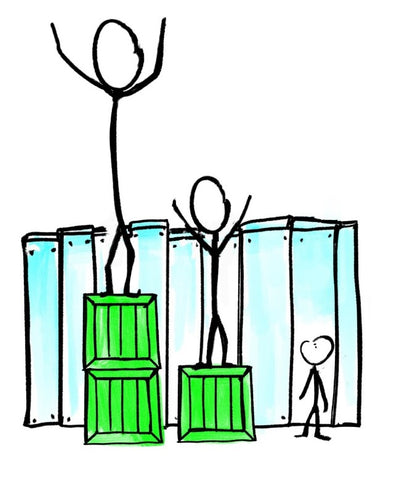The following article is based on Julien S Bourrelle's TEDx lecture given in Arendal, Norway.
The meaning of the word "equality" and its associated value varies depending on culture.
Does your culture understand "equality" as equality of results or equality of opportunity?
A national culture, a business culture or the culture of a group of individual may have a completely different understanding of the word "equality".
One culture may understand equality as providing the same resources to everyone, independently of someone's potential or abilities.
Here everyone is provided with the same equal resources.

In other cultures equality as more to do with the result of the policies that are adopted.
Such societies or organisations have a tendency to help those who are struggling so that everyone be more or less equal in society.
In this understanding of equality, one will funnel resources from those who are the best to those who are struggling.
Those struggling can then reach the same level as those who are stronger or more intelligent.
This understanding is typical of the Scandinavian Social Democracies, or otherwise in many public sector around the world.
An interesting example of this is in the health sector.
While the public sector tries to funnel resources - or priority of treatment - to those who need it the most ("the weak"), the private sector funnels resources to those who can pay best (the "strongest").

In the third understanding of equality, everyone will have the same opportunity to get the extra resource, but only the strongest will manage to get it.
Often through a reward system favoring competition and achievements.
This is typical of more competitive societies where there is a strong focus on excellency.
A certain threshold will be put in place, or requirement to fulfill, in order to gain extra resources, reward or support.
That requirement is the same for everyone, everyone as an equal opportunity to reach that threshold.
A good example of such system can easily be seen in the field of education.
"If you get to the top 5% of the class, you are going to get this great scholarship to go to this top university."
Everyone has the same opportunity to get the scholarship - you just need to get good grades - yet only the strongest most clever people will get the best grades.
Resources will then be funneled towards the best performers so that they can develop to their full potential.
On an individual basis, this is great, you get excellent support if you are good and you want to be excellent.
On a society basis, it creates bigger differences between people.

If you come from a society or an organisation where you are used to being rewarded when you perform well and you move into a society or an organisation where there is a tendency to help the weak, you may get into a lot of frustration.
If you perform very well, you may not get any extra resources, as you are already good.
The extra resources (money, time, etc) will be redistributed to help those who are struggling.

Challenge yourself to see the world in the perspective of others.
You will understand better the set of value that drives someone's behaviors.
Be more aware of your own biases, of your own expectations and the set of values that drives your behaviors.
